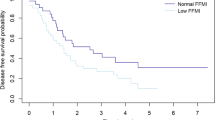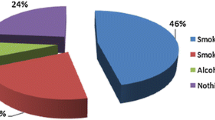Abstract
Purpose
The aim of this study was to study the nutritional profile of node-negative and node-positive patients undergoing treatment for head and neck squamous cell cancer (HNSCC).
Methods
This prospective cohort study was conducted between 2018 and 2020. Patients diagnosed with HNSCC, planned for treatment, were enrolled after written informed consent. In node-negative (N0) and node-positive (N +) cohorts of patients, nutritional status was determined using anthropometric measures and Subjective Global Assessment (SGA) scale pre-treatment, and during and after treatment. Statistical analysis was performed using SPSS version 22. Data was analyzed using parametric and non-parametric tests, and p value of 0.05 was considered significant.
Results
In total, 161 patients were analyzed, 73 N0 and 88 N + cohorts. Pre-treatment, 9.6 to 20.4% patients in N0 and 23.9 to 32.8% patients in N + cohorts were malnourished. Incidence of malnutrition at completion of treatment was 40.8 to 52.5% overall, 20.5 to 41.1% N0, and 39.5 to 62.8% N + . Mean reduction in weight (11.1% ± 7.82 vs 6.26% ± 8.3, p = 0.000), mean reduction in BMI (2.57 ± 1.87 vs 1.29 ± 1.62, p = 0.000), median reduction in MUAC (2 cm vs 1 cm, p = 0.000), and median increase in SGA score (13 vs 6, p = 0.000) were higher in multi-modality as compared to those in a single-modality treatment. Similar findings were noted in N0 and N + cohorts.
Conclusion
As compared to N0, N + patients had higher burden of malnutrition at diagnosis, and more worsening of nutritional parameters during treatment. More decline in nutritional status was seen in patients receiving multi-modality as compared to single-modality treatment.
Similar content being viewed by others
Data availability
Available.
Code availability
SPSS version 22.
References
Ferlay J et al (2019) Estimating the global cancer incidence and mortality in 2018: GLOBOCAN sources and methods. Int J Cancer 144:1941–1953
Bray F et al (2018) Global cancer statistics 2018: GLOBOCAN estimates of incidence and mortality worldwide for 36 cancers in 185 countries. CA Cancer J Clin 68:394–424
Ferlay J et al (2018) Global Cancer Observatory: cancer today. Lyon, France: International Agency for Research on Cancer (accessed 18 September 2020). IARC. https://gco.iarc.fr/today
Hashibe M et al (2007) Alcohol drinking in never users of tobacco, cigarette smoking in never drinkers, and the risk of head and neck cancer: pooled analysis in the International Head and Neck Cancer Epidemiology Consortium. J Natl Cancer Inst 99:777–789
Mehanna H et al (2013) Prevalence of human papillomavirus in oropharyngeal and nonoropharyngeal head and neck cancer–systematic review and meta-analysis of trends by time and region. Head Neck 35:747–755
Jiang H et al (2019) Can public health policies on alcohol and tobacco reduce a cancer epidemic? Australia’s experience. BMC Med 17:213
Isenring EA, Capra S, Bauer JD (2004) Nutrition intervention is beneficial in oncology outpatients receiving radiotherapy to the gastrointestinal or head and neck area. Br J Cancer 91(3):447–452
Rinkel RN et al (2016) Prevalence of swallowing and speech problems in daily life after chemoradiation for head and neck cancer based on cut-off scores of the patient-reported outcome measures SWAL-QOL and SHI. Eur Arch Otorhinolaryngol 273:1849–1855
Hutcheson KA et al (2019) Two-year prevalence of dysphagia and related outcomes in head and neck cancer survivors: an updated SEER-Medicare analysis. Head Neck 41:479–487
De Luis DA, Izaola O, Aller R (2007) Nutritional status in head and neck cancer patients. Eur Rev Med Pharmacol Sci 11(4):239–243
Tchekmedyian NS, Zahyna D, Halpert C, Heber D (1992) Assessment and maintenance of nutrition in older cancer patients. Oncology (Williston Park) 6(2 Suppl):105–111
Windon MJ et al (2018) Increasing prevalence of human papillomavirus-positive oropharyngeal cancers among older adults. Cancer 124:2993–2999
Bossola M (2015) Nutritional interventions in head and neck cancer patients undergoing chemoradiotherapy: a narrative review. Nutrients 7(1):265–276
Urs Müller-Richter C, Betz S Hartmann et al (2017) Nutrition management for head and neck cancer patients improves clinical outcome and survival. Nutr Res 48:1–8. https://doi.org/10.1016/j.nutres.2017.08.007
Bossola M (2015) Nutritional interventions in head and neck cancer patients undergoing chemoradiotherapy: a narrative review. Nutrients 7(1):265–276. https://doi.org/10.3390/nu7010265
Bressan V, Stevanin S, Bianchi M et al (2016) The effects of swallowing disorders, dysgeusia, oral mucositis and xerostomia on nutritional status, oral intake and weight loss in head and neck cancer patients: a systematic review. Cancer Treat Rev 45:105–119. https://doi.org/10.1016/j.ctrv.2016.03.006
Ackerman D, Laszlo M, Provisor A et al (2018) Nutrition management for the head and neck cancer patient. Cancer Treat Res 174:187–208. https://doi.org/10.1007/978-3-319-65421-8_11
Sandmael JA, Sand K, Bye A et al (2019) Nutritional experiences in head and neck cancer patients. Eur J Cancer Care (Engl) 28(6):e13168. https://doi.org/10.1111/ecc.13168
Wood RM, Lander VL, Mosby EL et al (1989) Nutrition and the head and neck cancer patient. Oral Surg Oral Med Oral Pathol 68(4):391–395. https://doi.org/10.1016/0030-4220(89)90134-5
Yanni A, Dequanter D, Lechien JR et al (2019) Malnutrition in head and neck cancer patients: impacts and indications of a prophylactic percutaneous endoscopic gastrostomy. Eur Ann Otorhinolaryngol Head Neck Dis 136(3S):S27–S33. https://doi.org/10.1016/j.anorl.2019.01.001
Langius JAE, Zandbergen MC, Eerenstein SEJ et al (2013) Effect of nutritional interventions on nutritional status, quality of life and mortality in patients with head and neck cancer receiving (chemo)radiotherapy: a systematic review. Clin Nutr 32(5):671–8. https://doi.org/10.1016/j.clnu.2013.06.012
Neoh MK, Zaid ZA, Daud ZAM et al (2020) Changes in nutrition impact symptoms, nutritional and functional status during head and neck cancer treatment. Nutrients 12(5):1225. https://doi.org/10.3390/nu12051225
Mulasi U, Vock D, Jager-Wittenaar H et al (2020) Nutrition status and health-related quality of life among outpatients with advanced head and neck cancer. Nutr Clin Pract 35(6):1129–1137. https://doi.org/10.1002/ncp.10476
Cereda E, Cappello S, Colombo S et al (2018) Nutritional counseling with or without systematic use of oral nutritional supplements in head and neck cancer patients undergoing radiotherapy. Radiother Oncol 126(1):81–88. https://doi.org/10.1016/j.radonc.2017.10.015
Britton B, Baker AL, Wolfenden L et al (2019) Eating As Treatment (EAT): a stepped-wedge, randomized controlled trial of a health behavior change intervention provided by dietitians to improve nutrition in patients with head and neck cancer undergoing radiation therapy (TROG 1203). Int J Radiat Oncol Biol Phys 103(2):353–362. https://doi.org/10.1016/j.ijrobp.2018.09.027
Crowder SL, Najam N, Sarma KP et al (2020) Head and neck cancer survivors’ experiences with chronic nutrition impact symptom burden after radiation: a qualitative study. J Acad Nutr Diet 120(10):1643–1653. https://doi.org/10.1016/j.jand.2020.04.016
Talwar B, Donnelly R, Skelly R et al (2016) Nutritional management in head and neck cancer: United Kingdom National Multidisciplinary Guidelines. J Laryngol Otol 130(S2):S32–S40. https://doi.org/10.1017/S0022215116000402
Author information
Authors and Affiliations
Contributions
All the authors contributed to the study conception and design. Material preparation, and data collection and analysis were performed by Anshika Arora, Sunil Saini, and Meenu Gupta. The first draft of the manuscript was written by Anshika Arora and all the authors commented on previous versions of the manuscript. All the authors read and approved the final manuscript.
Corresponding author
Ethics declarations
Ethics approval
Ethics committee approval number: SRHU/HIMS/ETHICS/2018/115.
Consent to participate
A written informed consent was obtained from all participants.
Consent for publication
Consent for publication was obtained from the Institutional Research Committee.
Conflict of interest
The authors declare no competing interests.
Additional information
Publisher's note
Springer Nature remains neutral with regard to jurisdictional claims in published maps and institutional affiliations.
Rights and permissions
About this article
Cite this article
Arora, A., Saini, S. & Gupta, M. Pattern of nutritional status in node-negative versus node-positive head and neck cancer patients undergoing treatment: a prospective cohort study. Support Care Cancer 30, 8029–8039 (2022). https://doi.org/10.1007/s00520-022-07245-6
Received:
Accepted:
Published:
Issue Date:
DOI: https://doi.org/10.1007/s00520-022-07245-6




